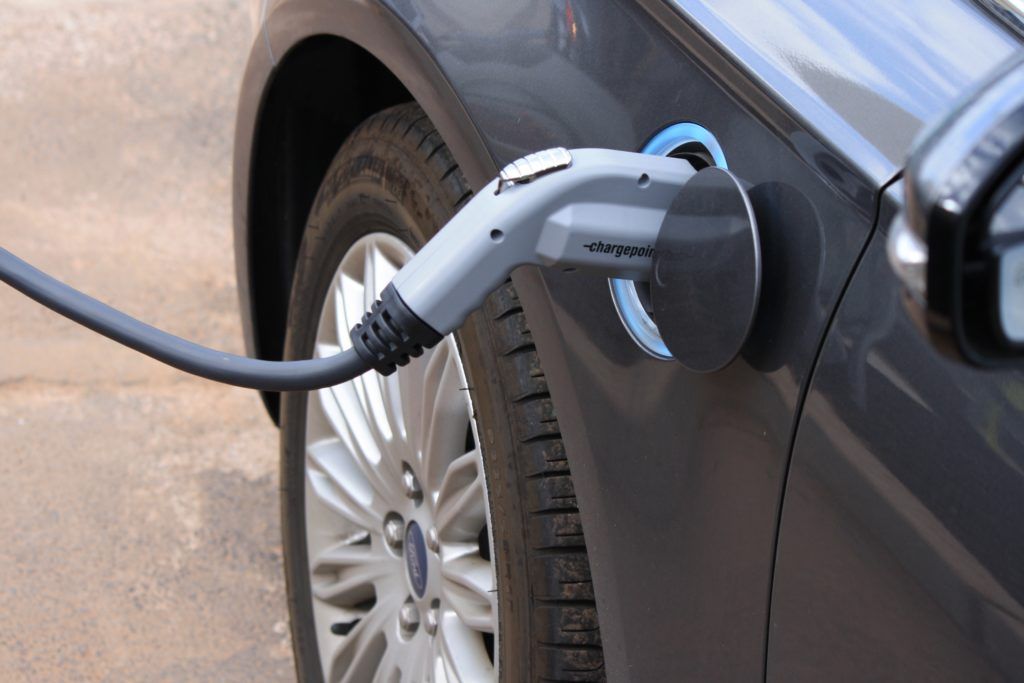
Canadians, including Ontarians, are getting charged up about electric cars. It’s time for the government and its regulators to listen to the people and give them what they want. (Photo: Noya Fields via Flickr)
Ontarians and their government must ready themselves for the coming shift to electric vehicles or risk playing catch-up to regions — domestic and overseas — that are already riding a transformative electric wave.
Last month, I took a road trip in an electric car: the Tesla Model 3. Despite some initial range anxiety, I was able to get from point A to B and back again safely and easily. After driving a short while, and thanks to the long range of my EV, any fears of being left chargeless on the roadside were quickly set aside. With zero emissions per kilometre, I got to experience how far we’ve come with low-carbon mobility.
According to a March 2019 poll by Abacus Data and Clean Energy Canada, most Canadians think a shift to electric vehicles will happen within 15 years or less. (Half of Canadians think it will happen in under 10 years.)
88 per cent of EV drivers said they would never go back to driving a fossil fuel powered car
After my road trip, I believe the latter is the case, and that Ontario can be a leader in making it happen. But EVs need not be all about the allure of zero emissions. My EV ran smoother and quieter and performed better than any vehicle I’ve driven. In a recent survey by Fully Charged, 88 per cent of EV drivers said they would never go back to driving a fossil fuel powered car. Who can resist going from zero to 100 kilometres per hour in 3.4 seconds?
Aside from the superior drive, the financial savings are also appealing. With fewer parts to break down, EVs have fewer maintenance requirements and can save drivers up to $3,000 a year in gas costs, depending on the car.
The International Energy Agency predicts 130 million EVs on the road by 2030. In countries like Norway, where almost 60 per cent of new cars sold are electric, waiting lists of people looking to buy an EV are in the thousands. The imports can’t keep up.
How was Norway able to catch the wave? Government policy played a huge role by removing sales tax on EVs and giving drivers access to restricted bus lanes. The government also invested heavily in infrastructure and enabled a variety of public-private partnerships on infrastructure and research and development. Being leaders in innovation and its related “coolness” factor fuelled the Norwegian public’s interest and support and continues to do so today.
We must turn things around soon if we wish to catch up to leading jurisdictions and apply our innovation prowess.
From the government leadership side, Ontario has taken some big steps backward. We must turn things around soon if we wish to catch up to leading jurisdictions and apply our innovation prowess.
Last year, the Ontario government cancelled the EV incentive program, which resulted in a large reduction in sales. According to Electric Mobility Canada, just over 44,000 EVs were sold in Canada in 2018, primarily across Quebec, Ontario and British Columbia. In the first quarter of 2019, sales rose 50 and 56 per cent in B.C. and Quebec, respectively, but dropped 55 per cent in Ontario. The differentiator? Quebec and B.C. continue to provide EV rebates.
The federal government, with its target to sell 100 per cent zero-emission vehicles by 2040, has stepped in to fill some of those gaps. In May, it introduced a $5,000 rebate to consumers who purchase EVs, which can be combined with provincial rebates for those lucky enough to live in provinces that understand their value. The government also introduced tax incentives for businesses that buy EVs and plans to invest $310 million in EV infrastructure.
More than 60 per cent of Canadians say that if it were up to them, most consumers would eventually drive EVs. Affordability is an issue, and EVs are still a luxury in Canada. But in countries like India, EV models for under $5,000 are being developed to ensure accessibility across socioeconomic divides. Something similar could be brought to market here as well.
After my road trip, I have become an EV convert.
Canadians, including Ontarians, are getting charged up about electric cars. It’s time for the government and its regulators to listen to the people and give them what they want.
Our Work
Always grounded in sound evidence, the David Suzuki Foundation empowers people to take action in their communities on the environmental challenges we collectively face.



